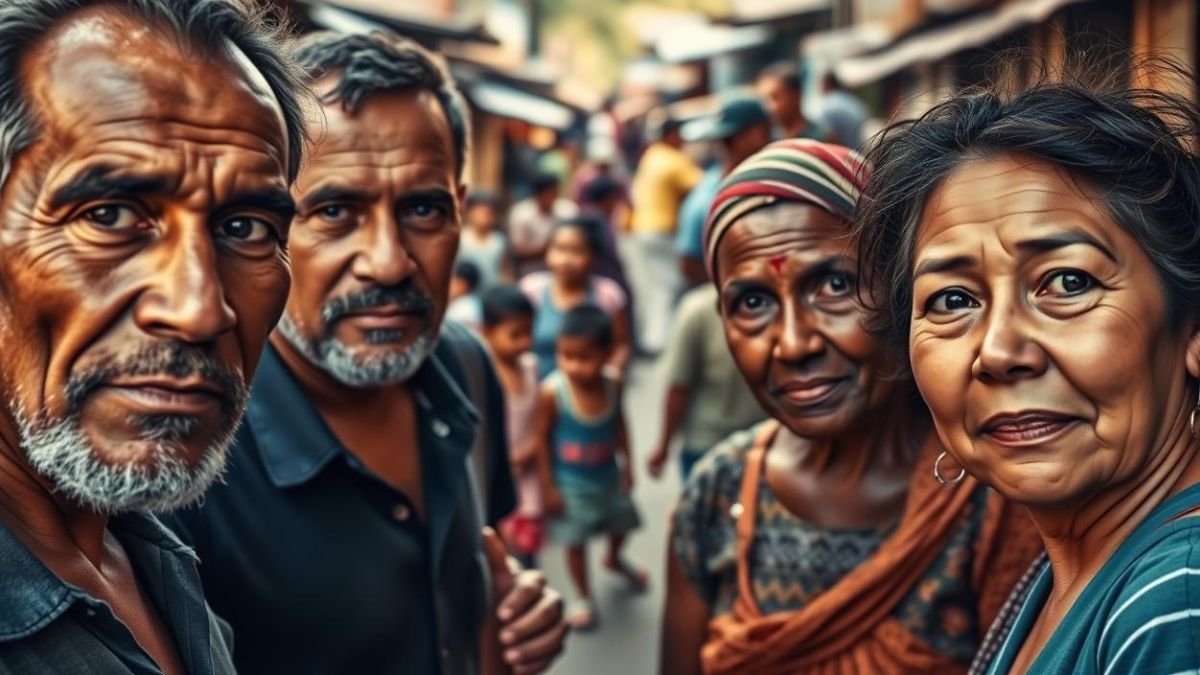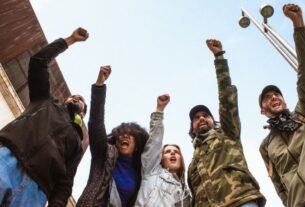Introduction
What if the true champions of change in Brazil aren’t the well-known figures, but rather the everyday heroes tirelessly working to uplift their communities? This article takes you on a journey through the inspiring stories of people whose lives reflect resilience, hope, and transformation. Discover seven remarkable individuals who embody the spirit of empowerment and meaningful community impact.
From local leaders advocating for women’s rights to activists transforming education in underserved areas, their profound influence is a testament to the incredible potential for positive change within Brazilian communities. Prepare to be inspired by their dedication, resilience, and the far-reaching legacies they create.
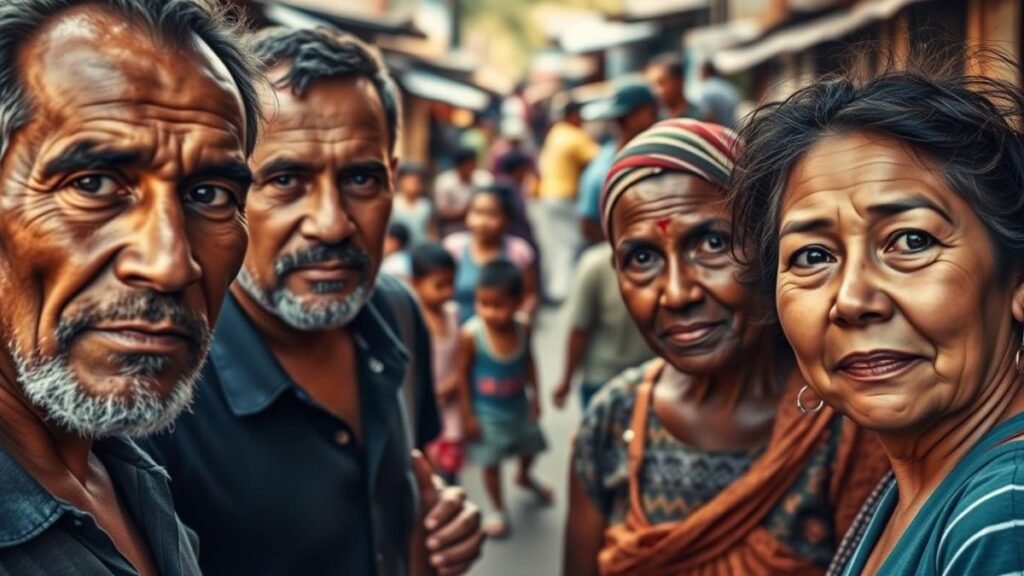
Key Takeaways
- Everyday heroes play a crucial role in community impact.
- Local leaders inspire transformative change in Brazilian communities.
- Grassroots efforts make a significant contribution to social development.
- Empowerment and advocacy are central themes in these inspiring stories.
- Understanding these narratives helps us appreciate the resilience of communities.
Stories of People: The Power of Community Impact
Grassroots movements play a pivotal role in shaping the fabric of Brazilian society. Community leaders often emerge from local initiatives and work tirelessly to foster resilience and creativity, addressing pressing socioeconomic challenges. The grassroots nature of these movements enables unique responses to local needs, resulting in a significant community impact that may otherwise go unrecognized.
The Importance of Local Initiatives
Local initiatives are essential for empowering citizens and creating sustainable change. They serve as the building blocks of community impact by focusing on the specific needs of residents. Examples include educational programs, environmental projects, and health services, all designed to cultivate growth and progress within communities. These initiatives reflect the involvement of community leaders who mobilize resources, inspire participation, and promote solidarity among residents.
Understanding the Brazilian Context
The Brazilian context presents a landscape characterized by cultural diversity and historical challenges, including inequality and marginalization. Amid these complexities, the Brazilian beauty of its people, traditions, and resilience shines through. Community leaders in Brazil navigate this environment by leveraging grassroots movements to advocate for social justice and equitable opportunities. Their efforts underscore the importance of creating inclusive spaces where all individuals can thrive, ultimately contributing to a more unified and resilient society.
Mãe Aparecida de Xangô: A Priestess with an Open Heart
Mãe Aparecida de Xangô plays a pivotal role in her community as a respected community priestess who embodies the spirit of Candomblé. Her commitment to this Afro-Brazilian religion extends beyond ritual; it forms the backbone of her dedication to uplifting those around her. Mãe Aparecida’s open-door policy invites individuals from all walks of life, creating a safe haven for support and guidance.
Her Commitment to Candomblé and Community
The essence of Mãe Aparecida’s work lies in her unwavering commitment to Candomblé. Through spiritual guidance and rituals, she fosters a sense of belonging and cultural pride among her followers. Her active engagement strengthens community bonds, encouraging collective healing and resilience. Mãe Aparecida’s leadership radiates through various community events that highlight the richness of Afro-Brazilian culture, allowing participants to reconnect with their roots.
Impact on Local Women’s Empowerment
Mãe Aparecida places a strong emphasis on women’s empowerment within her community. She champions education and personal development, recognizing that knowledge is a powerful tool against systemic oppression. By hosting workshops and discussions, she inspires women to share their stories and experiences, instilling confidence and fostering a sense of sisterhood. Her efforts have not only uplifted individual lives but have also cultivated a generation of empowered women eager to contribute to the betterment of their community.
Monica dos Santos Francisco: The Voice of Morro do Borel
Monica dos Santos Francisco, affectionately known as “Nega do Borel,” has carved a remarkable path in her journey from childhood to becoming a prominent community leader. Her experiences growing up in Morro do Borel, a favela in Rio de Janeiro, have deeply influenced her activism. Facing numerous challenges, Monica transformed her adversities into a passionate commitment to social change.
Her Journey from Childhood to Activism
From an early age, Monica encountered the harsh realities of life in poverty. She drew strength from her surroundings and began advocating for her community. Events such as natural disasters propelled her into action; instead of succumbing to despair, she organized relief efforts to support those most affected. Her drive was fueled by a desire to uplift the marginalized, showcasing the essential role of community leadership in times of crisis.
Creating Lasting Change in the Community
Monica dos Santos Francisco has become a vital figure in pushing for initiatives that support the residents of Morro do Borel. Her activism focuses on creating sustainable programs that address education, health, and social services. Through her efforts, she inspires others to engage in community development. Monica’s work not only highlights the challenges faced by her community but also illustrates how grassroots activism can lead to significant and lasting change.
Lúcia Cabral: Aunty Lúcia’s Dedication to Education
Lúcia Cabral, affectionately known as Aunty Lúcia, has become a cornerstone of the Complexo do Alemão community through her unwavering dedication to education. As the director of EDUCAP, she champions various educational programs that aim to uplift the youth in challenging environments. Aunty Lúcia’s commitment reflects her belief in the transformative power of learning and its potential to inspire change in the favelas.
Running Educational Programs in the Favela
Under Lúcia’s leadership, EDUCAP has developed an array of educational programs tailored to meet the unique needs of the community. These programs focus on key areas, such as literacy, the arts, and vocational training, aiming to provide essential skills and knowledge. The initiative not only promotes academic achievement but also fosters a sense of belonging among participants, reinforcing their connection to the community.
Her Vision for Youth Empowerment
Lúcia Cabral envisions a future where every young person has the opportunity to thrive. She understands that education is a powerful tool for empowering young people, helping them realize their full potential. By creating a supportive learning environment, Aunty Lúcia inspires students to embrace their abilities and overcome obstacles, emphasizing that collective growth is achievable. Her work illustrates the lasting impact of community educators dedicated to fostering hope and resilience.
Adriana Evangelista: The Entrepreneurial Spirit
Adriana Evangelista embodies the essence of entrepreneurship within the food service industry. Facing numerous challenges throughout her life, she transformed adversities into opportunities that inspire countless others. Her journey not only demonstrates resilience but also highlights the significant impact that female business owners can have on their communities.
Transforming Challenges into Opportunities
Beginning her career at a young age, Adriana cultivated her passion for cooking and creativity. Each obstacle she encountered served as a motivation to innovate and improve her business. By offering delicious, unique dishes, she managed to carve a niche in the competitive food service environment. Her commitment to excellence and flair for taste quickly attracted a loyal customer base.
Her Influence as a Female Business Owner
As a successful female business owner, Adriana utilizes her platform to empower women in her community. She fosters workshops that focus on culinary skills, aimed at encouraging local women to pursue their own entrepreneurial dreams. By actively participating in community initiatives, Adriana Evangelista embraces the concept of community impact, showing how a thriving business can drive economic change in the region.
Joana Pinheiro: A Young Trans Woman’s Fight for Recognition
Joana Pinheiro stands as an inspirational figure in the landscape of trans representation in Brazil. As a passionate LGBTQ+ activist, she advocates vigorously for media equity and the recognition of diverse gender identities. Joana’s journey highlights the critical challenges faced by the trans community, emphasizing the necessity of visibility and acceptance within a society that often marginalizes them.
The Importance of Representation in Media
Media plays a fundamental role in shaping perceptions and understanding of various social issues, including gender identity. Joana Pinheiro believes that a positive portrayal of trans individuals can counter stereotypes and foster a more inclusive narrative. Her advocacy for media equity aims to ensure that transgender stories and experiences are accurately represented, reflecting the true diversity of the LGBTQ+ community.
Through her work, Joana emphasizes the vital connection between social justice and equitable representation in media. Promoting trans representation encourages acceptance and fosters a more supportive environment for LGBTQ+ individuals. Joana’s efforts resonate beyond entertainment, influencing societal attitudes and policies that can affirm the rights of marginalized communities.
Thaís Ferreira: Empowering Women Through Health and Wellness
In today’s evolving landscape of women’s health, Thaís Ferreira stands out as a dedicated advocate for maternal health and community wellness. Through her work with Mãe & Mais, she strives to transform the healthcare experience for mothers in Brazil. Her initiatives are centered on ensuring that women receive not only necessary medical attention but also comprehensive education surrounding their health.
Her Work with Mãe & Mais
Thaís Ferreira’s commitment to empowering women is evident through Mãe & Mais, a project that aims to create a supportive community for mothers. The initiative focuses on delivering accessible healthcare services, enabling women to understand their health needs and make informed decisions about their care. By providing workshops and resources, Mãe & Mais emphasizes the importance of knowledge in bridging the gap between healthcare and daily living.
Promoting Healthcare Access for Mothers
Healthcare access remains a significant barrier for many women. Thaís Ferreira effectively addresses this challenge by advocating for a system that prioritizes maternal health. Her efforts contribute to improved healthcare outcomes while fostering an environment that supports mothers. The focus on community wellness fosters a network of solidarity, enabling women to share experiences and resources, ultimately strengthening the community.
Taísa Machado: The Embodiment of Creative Resistance
Taísa Machado stands out as a powerful figure in the realm of cultural activism, utilizing her artistic voice to challenge societal norms. Through her work, she highlights the significance of art as a catalyst for social change within the context of Afro-Brazilian culture. Her creative resistance not only elevates marginalized voices but also inspires dialogue surrounding identity and community.
The Role of Art and Culture in Social Change
Art has long served as a medium for expressing dissent and fostering unity. Taísa Machado embodies this notion by integrating elements of AfroFunk into her projects, which address crucial social issues. These initiatives explore themes of exclusion, empowerment, and heritage, demonstrating how cultural expression can bring about change. The intersection of art and activism provides a lens through which one can understand the fabric of Brazilian society.
| Aspect | Taísa Machado’s Approach | Impact on Community |
|---|---|---|
| Artistic Medium | AfroFunk, Dance, Visual Arts | Promotes cultural pride and awareness |
| Social Themes | Identity, Marginalization, Empowerment | Encourages dialogue and understanding |
| Community Involvement | Workshops, Performances, Collaborations | Strengthens community bonds and resilience |
Through these artistic endeavors, Taísa Machado not only embodies creative resistance but also acts as a catalyst for meaningful change within her community. By harnessing the power of art, she transforms narratives around Afro-Brazilian culture, urging society to reconsider its perspectives and values.
The Collective Strength of Local Leaders
The power of local leaders plays a vital role in fostering collective strength within communities. Everyday actions, carried out by passionate individuals, can lead to substantial community change. These local heroes inspire others to engage in grassroots initiatives, making a real difference in the pursuit of social justice.
How Everyday Actions Create Big Changes
In Brazil, local leaders embody the spirit of transformation. Their grassroots initiatives empower citizens to come together, creating a network of support and action. Through collaboration, they tackle pressing issues and influence positive change. Here are some notable examples of how everyday actions translate into larger impacts:
- Mobilizing community resources for educational programs.
- Organizing health workshops to improve well-being.
- Advocating for equitable access to services and opportunities.
Each effort contributes to a stronger community united around shared goals. Local leaders serve as catalysts, demonstrating that social change is possible through consistent and determined action. The collective strength harnessed by these individuals enables communities to thrive, paving the way for a brighter future.
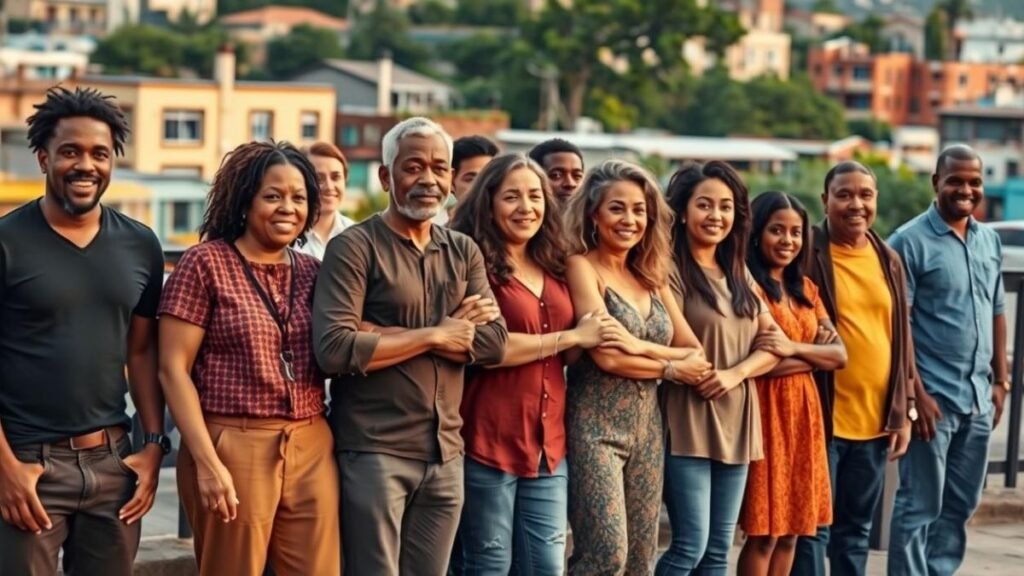
The Role of Women in Brazilian Communities
Women play a vital role in the fabric of Brazilian communities through their unwavering commitment to education and activism. Their contributions extend beyond traditional boundaries, actively challenging gender norms and advocating for positive change. In many cases, these women have become catalysts for progress, inspiring others to join the fight for gender equality.
Empowerment Through Education and Activism
Education serves as a key to unlocking opportunities for women in Brazil. Initiatives launched by women not only focus on personal development but also aim to uplift entire communities. Many programs emphasize a holistic approach to learning, detaching from mere academic success and encompassing life skills and social responsibilities. This focus on education empowers women, enabling them to become influential leaders in their communities.
A range of activism initiatives highlights the urgent need for gender equality across various sectors. Women activists in Brazilian communities spearhead efforts to address issues such as violence against women, inadequate access to healthcare, and lack of representation in decision-making processes. They unite with like-minded individuals to raise awareness and mobilize resources, significantly amplifying their impact.
- Women’s leadership in education leads to more inclusive learning environments.
- Activism raises awareness about pressing social issues affecting women.
- Networking among women enhances collaboration and resource sharing.
- Community-focused programs foster resilience among women and their families.
Through persistent efforts in education and activism, women continue to reshape Brazilian communities, laying the groundwork for future generations. Their stories not only illuminate the challenges faced but also celebrate the triumphs that accompany the path toward empowerment and equality.
Indigenous Voices and Their Impact in Brazil
The persistent struggles faced by Indigenous communities in Brazil highlight an ongoing fight for Indigenous rights deeply rooted in a complex historical context. These groups face significant challenges related to land struggles, cultural preservation, and representation in broader society. Understanding their history reveals the resilience and determination of Indigenous peoples as they navigate contemporary challenges.
History of Indigenous Struggles for Rights
The historical context of Indigenous rights in Brazil dates back to the colonization era, characterized by significant land dispossession and cultural repression. Indigenous communities have fought tirelessly to reclaim their rights over generations. Documents and activism have revealed myriad injustices, including violence, displacement, and marginalization. The formation of legal frameworks, such as the 1988 Constitution, aimed to protect Indigenous lands, yet violations persist.
The Role of Indigenous Communities Today
Contemporary Indigenous movements actively advocate for rights and sovereignty, becoming critical players in discussions on environmental protection and social justice in Brazil. Leaders from various tribes engage in negotiations, protests, and awareness campaigns to raise awareness about land rights and cultural issues. These communities possess invaluable knowledge about biodiversity and sustainable practices, proving crucial in addressing global challenges related to climate change. Their voices continue to shape national dialogues, emphasizing the need for equitable representation and respect for Indigenous rights.
The Importance of Grassroots Movements
Grassroots movements in Brazil represent a vital force for social change, emerging from local communities to address pressing social issues. These community initiatives often arise from the lived experiences of marginalized groups who seek to promote activism and foster inclusivity. In Brazil, such movements empower individuals by providing them with a platform to express their concerns and aspirations, ultimately leading to sustainable development and transformation.
How Grassroots Initiatives Drive Change
Grassroots initiatives play a pivotal role in shaping the narrative of social justice in Brazil. These movements often consist of individuals uniting for a common cause, allowing them to challenge systemic inequalities effectively. For example, community-led projects in various Brazilian regions aim to create educational opportunities, enhance healthcare, and promote environmental sustainability.
By adopting innovative approaches, these grassroots movements address local challenges with local solutions. They encourage civic participation, urging community members to engage actively in decision-making processes. Through collective action, Brazilian grassroots movements inspire a renewed sense of agency among citizens, demonstrating that change can start at an individual level.
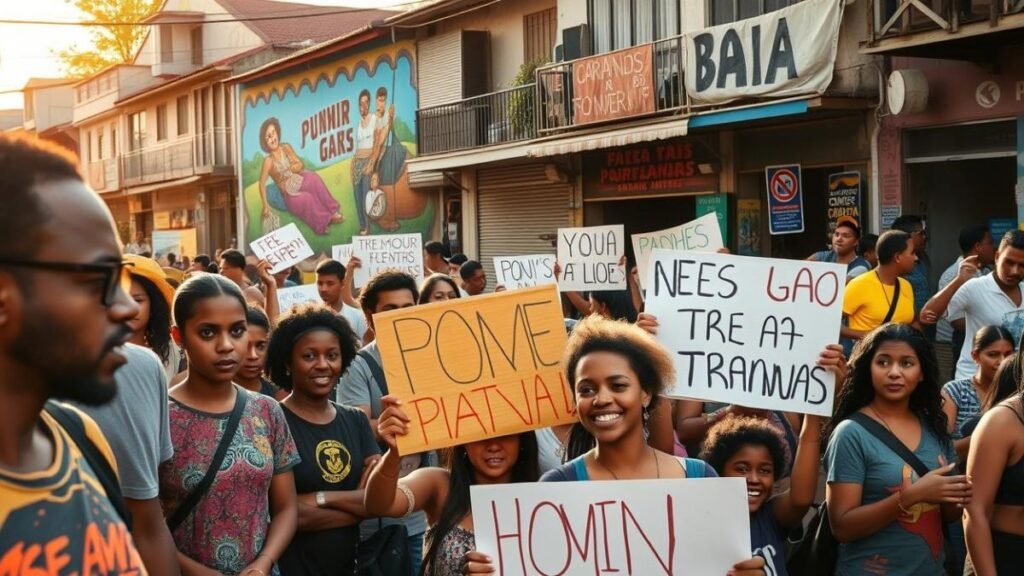
Overall, the resilience and determination exhibited in these grassroots movements underscore their significance in paving the way for lasting social change. As more citizens embrace activism, the potential for comprehensive reform becomes increasingly attainable, setting a powerful precedent for future generations.
Stories of People: A Reflection on Their Impact
The influence of community leaders in Brazil shapes the understanding of social change today. Each story presented reveals the challenges and strengths of individuals committed to creating a better future for their communities. These impact stories highlight how local initiatives foster connection, inspire resilience, and contribute to lasting legacies.
The enduring legacies of these community leaders can be felt across generations. They empower fellow Brazilians to pursue change, understanding that every small effort contributes to a larger narrative of progress. By documenting their journeys, society gains insight into the ripple effects of leadership and activism.
Conclusion
The stories shared throughout this article highlight the remarkable community impact that everyday individuals in Brazil can make. From local leaders like Mãe Aparecida de Xangô to the dedicated efforts of Monica dos Santos Francisco, these narratives illustrate that empowerment can stem from grassroots initiatives that address pressing social issues. These local heroes not only serve as champions for their communities but also act as catalysts for broader change, showing that powerful transformations often begin at the community level.
As Brazil faces ongoing challenges, the commitment of these individuals to advocacy and social justice paves the way for the future of activism. Engaging in local movements and supporting these tireless efforts is crucial for sustaining empowerment among vulnerable groups. By recognizing the significance of these stories, readers are encouraged to draw inspiration from these leaders and seek ways to contribute to their communities.
Looking ahead, the collective efforts of these local leaders exemplify the potential for meaningful change across Brazil. Individuals need to unite in fostering a culture of advocacy and solidarity, ensuring that the momentum for community impact continues to grow. As we celebrate their achievements, let us also commit ourselves to the work ahead, honoring their legacies and striving to enhance the well-being of all citizens. Learn Urban legend.
FAQ
What are grassroots initiatives, and why are they important in Brazil?
Grassroots initiatives are community-driven projects designed to address social issues and empower marginalized groups. They are vital in Brazil as they challenge systemic oppression, promote cultural diversity, and support local leadership in driving significant social change.
How do women contribute to community development in Brazil?
Women play a crucial role in community development by challenging traditional gender roles and advocating for education, empowerment, and equality. Their multifaceted contributions, through both activism and entrepreneurship, lead to a substantial social impact.
Who is Mãe Aparecida de Xangô, and what does she represent?
Mãe Aparecida de Xangô is a revered priestess in her community, recognized for her dedication to Candomblé and her inclusive approach, which fosters unity and resilience. She empowers women by promoting education and shared history among marginalized groups.
How does Lúcia Cabral impact the youth in her community?
Lúcia Cabral is dedicated to education and youth engagement in the Complexo do Alemão. As the director of EDUCAP, she focuses on providing educational opportunities to combat inequality and foster collective growth among young people.
What are the main challenges faced by the LGBTQ+ community in Brazil?
The LGBTQ+ community in Brazil faces significant societal pressures, discrimination, and violence. Activists like Joana Pinheiro strive for positive representation and increased visibility to promote acceptance and inclusivity.
What is the significance of Thaís Ferreira’s work with Mãe & Mais?
Thaís Ferreira’s initiatives with Mãe & Mais focus on providing accessible healthcare and education for mothers in Brazil, addressing health disparities while creating a supportive network for women’s empowerment and holistic well-being.
How does Taísa Machado use creative expression for social change?
Taísa Machado utilizes artistic mediums such as AfroFunk to challenge societal norms and uplift marginalized voices. Her work illustrates the transformative power of culture and creativity in driving social change.
Why are Indigenous communities essential in Brazil’s social movements?
Indigenous communities in Brazil play a critical role in advocating for land rights, cultural preservation, and social justice. Their historical struggles and resilience are central to national conversations around sovereignty and representation.
What can we learn from the stories of these everyday heroes?
These stories exemplify how local leadership and grassroots initiatives can inspire hope, resilience, and meaningful change within communities. They highlight the importance of collaboration, empowerment, and the impact that individual actions can have on society as a whole.

